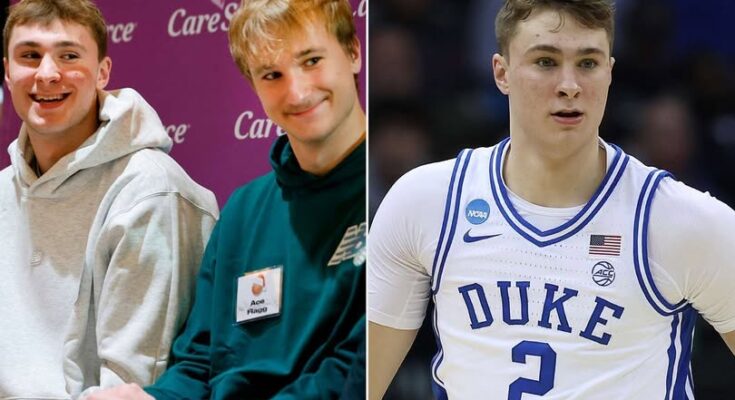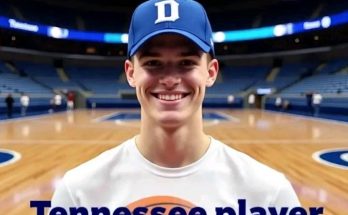Title: “Shadow and Spotlight: The Rise of Ace Flagg”
Ace Flagg knew what it felt like to be overshadowed. Not by failure, but by greatness. Born just minutes after his twin brother Cooper, Ace had spent his life beside a basketball prodigy — a once-in-a-generation talent whose name echoed through gymnasiums, sports blogs, and college recruitment offices before he was even old enough to drive.
From the outside, it was easy to see them as opposites. Cooper, with his effortless dominance, seemingly floated through the air, sinking jumpers from mid-range, slamming home put-backs, and blocking shots with such grace that he appeared to bend time. Ace, on the other hand, was more grounded. He was a strategist — a floor general who read defenses like a seasoned chess master, who played with grit, intelligence, and a quiet fire that only those closest to him truly understood.
By the time the Flagg twins reached their sophomore year of high school, Cooper was the name scouts whispered with reverence. ESPN had him pegged as a future top-3 NBA pick. Social media dubbed him “the next great hope.” But while Cooper’s highlight reels racked up millions of views, Ace was crafting a legacy in his own right — one less flashy, more subtle, but no less impactful.
“I don’t want to be the next Cooper Flagg,” Ace once told a reporter at a Maine Invitational tournament. “I want to be the first Ace Flagg.”
Newport, Maine, wasn’t exactly a basketball mecca. But the Flagg household was a crucible of hoops talent. Their mother, Kelly, was a former college star herself, and the garage backboard was a sacred space long before the twins could spell “Duke.”
Growing up, the twins competed relentlessly. Every one-on-one game ended in sweat, scraped knees, and sometimes bruised egos. But it was in these battles that Ace forged his identity — a player who never gave up, who never backed down, who learned to sharpen his tools against the best possible competition.
“It was always war,” Ace said, laughing in a podcast interview. “But the best kind. Coop made me better. I like to think I did the same for him.”
While Cooper’s ascension seemed predestined, Ace’s journey was defined by choice and determination. Coaches noticed how he studied film, how he asked questions during practice that other players didn’t think to ask. He wasn’t the most athletic player on the court, but he was often the smartest — and always the most competitive.
By junior year, both brothers transferred to Montverde Academy in Florida, a powerhouse school known for developing NBA talent. The transition was a proving ground. Suddenly, Ace was playing alongside — and against — future pros every single day. The speed, the physicality, the expectations — everything was turned up.
And he didn’t just survive.
He excelled.
While Cooper kept his recruitment open, flirting with powerhouses like Kentucky and UConn, Ace had eyes only for one school: Duke.
It wasn’t about legacy or headlines. It was about values — about the culture built by Coach K and sustained by Jon Scheyer. About the brotherhood.
“Duke just felt like home,” Ace explained. “It was the only place where I felt like I could grow not just as a player, but as a person. I wanted to earn my spot. Not be given it because of my last name.”
Duke, for their part, saw what many others were finally beginning to recognize — Ace Flagg wasn’t just Cooper’s brother. He was a floor leader, a brilliant passer, a dogged defender, and a fiercely loyal teammate. His basketball IQ was through the roof, and his willingness to do the dirty work — to box out, to take charges, to make the extra pass — made him invaluable.
When the commitment announcement came, it wasn’t a spectacle. Ace posted a simple photo on Instagram: him in a Duke jersey, head bowed, hands together.
The caption read:
“Earned, not given. Duke Brotherhood.”
In the national spotlight, comparisons were inevitable. Every stat line, every box score, every game was a new chapter in the unspoken narrative: Could Ace Flagg live up to the standard set by his twin?
But Ace refused to play that game.
He didn’t chase headlines. He didn’t respond to doubters. He just played basketball — with grit, with discipline, and with love for the game.
In his senior year, Ace led Montverde’s second unit like a seasoned veteran. He wasn’t always the top scorer, but he was often the reason they won. His leadership became undeniable — pulling teammates aside during timeouts, calling out defensive rotations, setting the tone in practices.
“I’d go to war with Ace Flagg any day,” said Montverde assistant coach Raul Dupree. “He’s the kind of player every great team needs. A guy who sacrifices for the good of the group. He’s special, even if he doesn’t scream it from the rooftops.”
That year, Montverde went undefeated. Cooper dazzled. But so did Ace — in his own way.
When Ace stepped onto Duke’s campus for summer workouts, he did so with a chip on his shoulder and a fire in his chest. The team was stacked — five-stars, McDonald’s All-Americans, transfer portal studs. No one handed out minutes. Everything had to be earned.
And that was exactly how Ace liked it.
“Every time he steps on the floor, he brings the intensity up,” said Duke head coach Jon Scheyer. “He’s a culture guy. He sets the tone. And he makes everyone better — that’s a rare trait.”
During Duke’s European summer tour, Ace emerged as a crucial piece of the puzzle. He wasn’t the leading scorer, but his fingerprints were all over every win — diving for loose balls, initiating offense, talking constantly on defense.
In a game against Real Madrid’s U20 team, Cooper had an off night. The crowd buzzed, waiting for Duke’s superstar to take over. Instead, it was Ace who calmly controlled the tempo, made three key steals, and hit a dagger corner three with 42 seconds left to seal the win.
Reporters flocked to Cooper after the game, but he pointed toward his brother and said,
“Talk to the real MVP.”
As the college season unfolded, Ace continued to build his name.
He became a fan favorite — the kind of player Duke’s Cameron Crazies adored: blue-collar, unselfish, all heart. He carved out a role as a sixth man early, then earned a starting spot midway through the season thanks to his relentless work ethic and clutch performances.
More importantly, he became a leader in the locker room.
“He’s the glue,” said teammate Jaylen Blanch. “When things get tense, he’s the voice that calms us. When we’re flat, he’s the spark. You can’t measure what he brings in a stat sheet.”
NBA scouts began to take notice, not just for his play, but for his mind. There was talk of Ace as a sleeper pick — the kind of player who might not go in the lottery but would thrive in the pros for a decade.
And still, Ace never flinched from the Cooper comparisons. He embraced them.
“That’s my brother,” Ace told reporters after a win over North Carolina. “We push each other, we love each other. But we’re writing our own stories.”
The true magic of Ace Flagg’s story isn’t just in his talent. It’s in his character — his refusal to be defined by external narratives, his relentless commitment to the team, his unwavering belief in carving his own path.
His bond with Cooper remained unshakable. Though their trajectories diverged — Cooper perhaps destined for NBA stardom straight out of college, Ace committed to developing his game, year by year — their support for each other never waned.
“We’re each other’s biggest fans,” Cooper said during the NCAA Tournament. “I know who I am because of Ace. And I think he’d say the same about me.”
When Duke made a run to the Final Four, it was Ace who hit a crucial three to beat Arizona in the Sweet 16. It was Ace who locked down a future NBA guard in the Elite Eight. And though they fell just short of a national title, Ace’s impact was undeniable.
As the confetti fell in the championship arena — not for Duke, but for their opponent — Ace stood at half court, eyes scanning the court, already thinking of next season.
Already thinking of how to get better.
In a world obsessed with superstardom, Ace Flagg chose a different route. He chose grit over glamour, work over hype, substance over style.
He wasn’t the headline.
He was the heart.
And in doing so, he showed a generation of young athletes that greatness doesn’t always have to come in neon lights. Sometimes, it’s the quiet fire, the second name on the roster, the player who never stops grinding — who leaves the most lasting legacy.
So when future Duke players walk through Cameron Indoor Stadium and see the names etched into history, one name will stand tall alongside legends:
Ace Flagg — the brother, the baller, the blueprint.
you’d like a follow-up story, media quotes, or a version formatted for publication.



